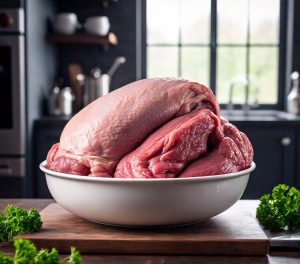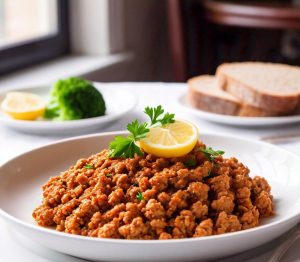A turkey is a large bird native to North America, traditionally served as the main course for Thanksgiving and Christmas dinners.
The question we’re exploring is whether you can cook this festive fowl in the microwave or not.
This article will delve into all aspects of microwaving a turkey, including its feasibility, possible cooking times, and any impacts on the nutrients and flavors of the bird from such a method. If it’s determined that turkeys are unsuitable for microwave preparation, we’ll discuss alternative methods to achieve your perfect holiday feast. To ensure comprehensive coverage of this topic, we’ll also answer frequently asked questions regarding turkey preparation and provide key tips and precautions. Our final verdict on microwaving turkeys will conclude the discussion.

Jump To:
Is it Possible to Cook a Turkey in the Microwave?
Yes, you can cook a turkey in the microwave. Although traditional oven roasting is the preferred method for many, microwaving a turkey is an alternative that provides quick and efficient results. However, due to size constraints and uneven heat distribution of some microwaves, it’s crucial to ensure even cooking by rotating the bird frequently. It’s also important to check the internal temperature with a kitchen thermometer – your turkey should reach at least 165 degrees Fahrenheit for safe consumption. So while it may not be conventional or yield as crispy skin, you definitely can microwave a turkey.
Facts About Cooking a Turkey in the Microwave
Here, we will discuss important things to note about cooking a turkey in the microwave.
- Cooking Time: Typically, for every pound of turkey, you would need six minutes of cooking time on 50% power.
- Size of the Turkey: Turkeys that are smaller than 12 lbs can be successfully microwaved.
- Microwave Settings: The optimal setting is generally at medium or defrost setting (30-50% full power).
- Turkey Preparation: Before putting it into the microwave, ensure your turkey is fully thawed and seasoned as per preference.
- Browning Effect: The Browning effect may not appear when cooked in a microwave; you may consider using a browning sauce for this purpose.
We have covered significant aspects related to microwaving a turkey. Now let’s delve deeper into some other nuances regarding this method of preparation.
Check out if you can cook turkey bacon in the microwave.
How Long Can You Microwave a Turkey?
The time to microwave a turkey generally depends on its weight. For example, for a 12-pound turkey, it would take about 20 minutes per pound in the microwave set at power level 5 or half-power. This means that if you’re microwaving this size of a bird, it will take approximately four hours to fully cook. However, for larger turkeys or those with different weights, using an online cooking calculator might be beneficial enough to adjust the time required.
Does Heating Turkey in the Microwave Destroy its Nutrients?
Microwaving food like turkey does not inherently destroy its nutrients more than other cooking methods do. In fact, as microwaving is often quicker than traditional cooking methods like roasting or frying; there’s less exposure to heat which could potentially preserve more nutrients. Nevertheless, overcooking any type of food can reduce nutritional value regardless of the method used.
Does Heating Turkey in the Microwave Affect the Flavors?
Microwaving a turkey can affect the flavor compared to other conventional methods of cooking such as roasting or baking. Specifically because microwaves heat food unevenly and quickly which may not allow for flavors to develop and meld together as they would under slower-cooked conditions.
Therefore it is suggested while micro-cooking your poultry always use appropriate seasonings & spices.
In conclusion, we have discussed how long we should microwave turkey, whether these quick heating mechanisms affect its nutrient content and, finally, do they alter their flavors.
Now let’s move on to some frequently asked questions about this topic.

Frequently Asked Questions (FAQs)
We will now look at the most commonly asked questions related to cooking turkey in the microwave.
Can you cook a turkey in the microwave?
Yes, you can cook a turkey in the microwave. However, it’s critical to adjust settings properly as microwaving uses electromagnetic waves for heating. Furthermore, size matters when choosing cooking time and power levels. Please ensure that your turkey fits inside your microwave comfortably without touching any sides to prevent uneven cooking.
What is the ideal cooking time for turkey in the microwave?
The ideal time to cook a turkey varies depending on the weight and power of your microwave oven. Typically, it takes around 10 minutes per pound when microwaved at full power. Always check with a thermometer that the internal temperature reaches 165°F before consuming.
Is it safe to defrost turkey in the microwave?
Absolutely! It is safe but not often recommended because of potential uneven thawing leading to safety concerns about bacteria growth. If done correctly with regular pauses and stirring if possible, defrosting a turkey in the microwave can be quick and convenient.
Does microwaving affect the nutritional value of turkey?
Microwave does indeed affect nutritional value; however, impact is minimal compared to other methods like boiling or frying which tend to drain away many nutrients into water or oil respectively while microwaving retains these within the food itself due short cooking times involved
I hope this answers all frequently asked questions related to how effectively you can use your microwave for preparing turkeys!
Final Word
In conclusion, using the microwave for cooking a turkey is entirely feasible provided we take precautions such as ensuring appropriate spacing inside the oven, choosing the right settings and monitoring internal temperature. Bear in mind that while microwaving might not be the traditional method, it can certainly come in handy especially if you are dealing with time constraints or don’t have access to a conventional oven.



